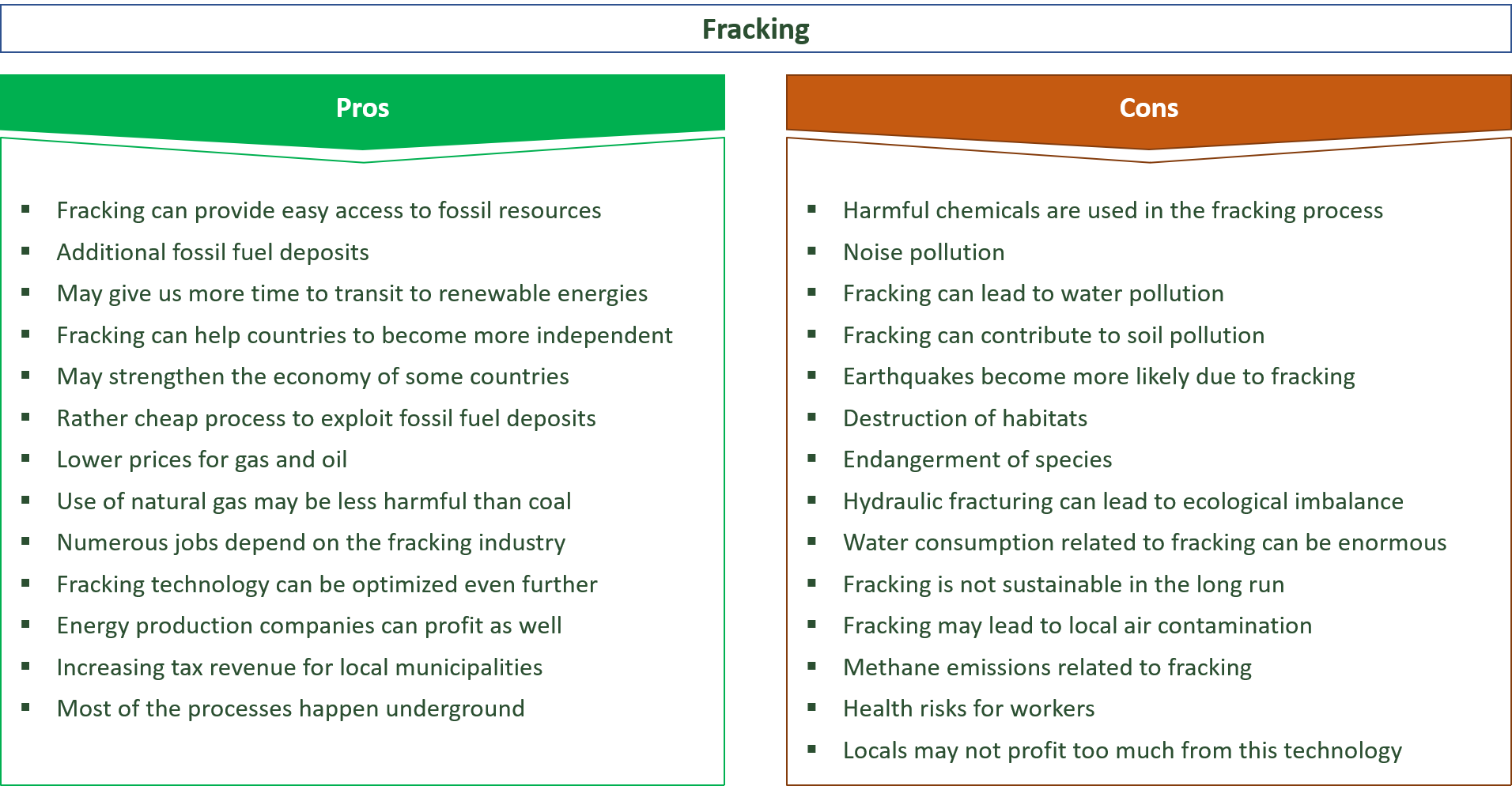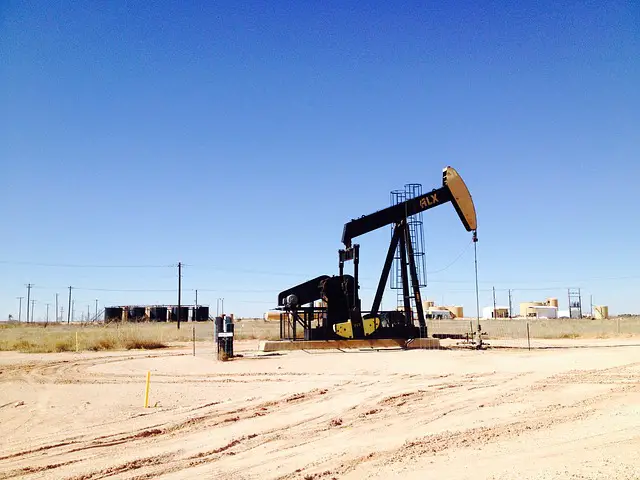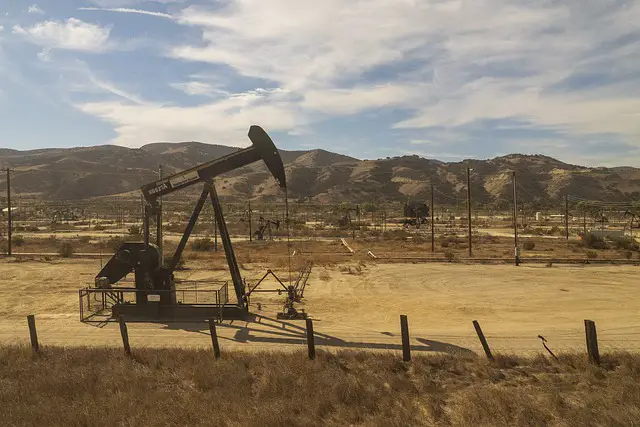“The issue of fracking is a stick in the hornet’s nest.”
Titus Welliver, Actor
Advantages & Disadvantages of Fracking

Fracking (also sometimes referred to as hydraulic fracturing or hydrofracking) is a technique that aims to fracture the bedrock by using a pressurized liquid.
This liquid is often a mix of water and other components like sand or additional chemicals.
The aim of fracking is to inject this fluid with high pressure into the wellbore in order to create cracks in rock formations.
In turn, natural resources like gas or petroleum can be exploited easier.
While fracking has become quite popular over the past decade, it also implies serious problems.
In this article, the pros and cons of fracking are shown.
Audio Lesson
Contents
Advantages of Fracking
- Fracking can provide easy access to fossil resources
- Additional fossil fuel deposits
- May give us more time to transit to renewable energies
- Fracking can help countries to become more independent
- May strengthen the economy of some countries
- Rather cheap process to exploit fossil fuel deposits
- Lower prices for gas and oil
- Use of natural gas may be less harmful than coal
- Numerous jobs depend on the fracking industry
- Fracking technology can be optimized even further
- Energy production companies can profit as well
- Increasing tax revenue for local municipalities
- Most of the processes happen underground
Fracking can provide easy access to fossil resources
One important advantage of fracking is that it gives us rather easy and efficient access to fossil fuels like natural gas or petroleum.
We as a global society are still heavily dependent on fossil fuels to ensure our energy supply.
Hence, until we finally completely switched to alternative energies, we will have to rely on fossil fuels like gas.
Therefore, fracking can help us to make this access as easy as possible so that we have a secure and reliable supply of fossil fuels for the next decades.
Additional fossil fuel deposits
Fracking also gives us the opportunity to exploit additional fossil fuel deposits.
Many people don’t know it but our fossil resources only last for a rather limited period of time.
This also implies that we would run out of fossil fuels sooner or later.
However, through the technology of fracking, we have access to additional fossil fuel deposits.
In turn, our overall global access to those fuels improves significantly and chances are that fracking provides us with the opportunity to supply humanity with natural gas for many additional years.
May give us more time to transit to renewable energies
Another benefit of hydraulic fracturing is that it gives us more time to transit to renewable energy sources.
While politicians often claim that we have to transit to alternative eco-friendly energies as soon as possible, the reality is that it will take many years or even decades until we will accomplish this energy transition process on a global scale.
Hence, in order not to run out of energy in the near future and to supply us with sufficient energy during this transition process, fracking can also be a great way to help us in this regard.
Fracking can help countries to become more independent
Fracking can also help many countries all over the world to become more independent.
Many countries currently rely on other countries to ensure their supply of fossil fuels.
However, this creates an enormous dependence and dependence is often not a good thing at all since the party that is dependent on another party will often have to accept quite poor trading conditions.
Through the technology of fracking, more countries could become independent from other countries regarding their energy supply since they would now be able to exploit natural gas deposits in their own country.
May strengthen the economy of some countries
If a country is able to produce higher amounts of fossil fuels, the economy of this country will likely also benefit from this development since the country can export more fossil fuels and will have more money for important infrastructure projects.
In turn, the general public would likely also benefit from this development since people would get better access to medical treatment or also get better education opportunities.
Rather cheap process to exploit fossil fuel deposits
Another upside of fracking is that it is a rather cheap process to extract fossil fuels out of the ground.
In fact, significant amounts of natural gas and petroleum can be extracted with the help of this technology at a rather low price.
Hence, fracking can also be considered to be a cheap and reliable way to supply humanity with fossil fuels until we finally managed to transit to renewable energies on a global scale.
Lower prices for gas and oil
Since the worldwide production costs for fossil fuels like natural gas can be lowered through the use of fracking, chances are that also the overall world-market price for gas will drop as well.
In turn, this can be quite beneficial for many companies and also for private persons who rely on products that are manufactured with the help of natural gas.
Consequently, numerous people all over the world could profit from hydraulic fracturing, at least to a certain extent.
Use of natural gas may be less harmful than coal
Proponents of fracking also often claim that the use of natural gas that is extracted with the help of fracking is still far less harmful to our environment compared to the use of coal.
Since it will still take many years or probably decades until we finally complete the transition from fossil to renewable energy sources, we have to rely on the fossil fuel alternative that is the least damaging for our environment.
Hence, fracking may also be justified from this perspective since alternatives like coal would be even more harmful to our planet.
Numerous jobs depend on the fracking industry
Since fracking has become quite popular over the past decade, numerous jobs had been created in this industry.
In fact, many people all over the world profit from job opportunities related to hydraulic fracturing.
Especially in poor regions with high unemployment rates, fracking companies are often the main employer in a region and without this industry branch, many people would lose their livelihood and would have to migrate to other regions in order to survive.
Thus, fracking can also be important to reduce the overall level of poverty in poor parts of our planet.
Fracking technology can be optimized even further
While fracking has been around for a while, the processes behind fracking are still not fully optimized yet.
In fact, since our technology progresses at rapid speed, chances are that scientists will be able to improve those processes even further in the future.
In turn, fracking may become less harmful to our environment and may become an important tool to supply us with energy until we finally made the transition to renewable energy sources.
Energy production companies can profit as well
Another benefit for fracking is that not only the general public can profit from it, this technology can also be beneficial for energy production companies which get access to an easy and cost-efficient way to extract large amounts of natural gas and petroleum out of the ground.
In turn, chances are that also the profits of those energy production companies increase significantly.
Consequently, those companies may also be able to employ even more workers and more people may be able to get out of poverty due to that.
Increasing tax revenue for local municipalities
If energy production companies make higher profits due to fracking and more people are able to earn higher wages, chances are that also local municipalities could profit from higher tax revenue.
In turn, many municipalities all over the world may be able to get out of debt and may have additional money to invest in important infrastructure projects.
Most of the processes happen underground
Since most of the processes related to fracking are done underground, there will also not be too much visual pollution from the fracking process.
In fact, the general public will often not even realize that this technique is used.

Disadvantages of Fracking
- Harmful chemicals are used in the fracking process
- Noise pollution
- Fracking can lead to water pollution
- Fracking can contribute to soil pollution
- Earthquakes become more likely due to fracking
- Destruction of habitats
- Endangerment of species
- Hydraulic fracturing can lead to ecological imbalance
- Water consumption related to fracking can be enormous
- Fracking is not sustainable in the long run
- Fracking may lead to local air contamination
- Methane emissions related to fracking
- Health risks for workers
- Locals may not profit too much from this technology
- Water scarcity related to fracking can become a serious problem
- Lax regulations regarding fracking in many countries
- Lower prices for fossil fuels may create flawed incentives for consumers
- Focus should lie on renewable energies instead of fossil fuels
- Unclear long-term effects of fracking
Harmful chemicals are used in the fracking process
Apart from the many important advantages of fracking, there are still some problems with it.
For instance, one disadvantage of fracking is that harmful chemicals are often used in the extraction process of natural gas.
Those chemicals can alter the structure of the soil and can also lead to the contamination of local ecosystems, with rather unclear effects on the local flora and fauna.
Noise pollution
Fracking also implies significant noise pollution.
In fact, the process of fracking is quite noisy and many people who live nearby those fracking stations way be affected by this noise in a quite negative manner.
Imagine you live in a region where you are bothered by the sounds of fracking stations all day long.
Chances are that you will become quite annoyed over time and also the resale value of your property may suffer quite a lot since not too many people want to experience this noise pollution.
Thus, fracking can have significant negative effects on people who live nearby those fracking facilities.
Fracking can lead to water pollution
Another problem with fracking is that it can lead to serious water pollution.
The chemicals that are used in the fracking process will often be disposed of right in the middle of nature instead of disposing of them in a proper manner.
In turn, this can lead to serious contamination of nearby rivers and lakes.
Consequently, also the aquatic life will suffer quite a lot in those regions and in order to protect those aquatic animals, fracking should only be done with great care.
Fracking can contribute to soil pollution
Fracking may also significantly pollute the soil.
The chemicals that are used in the fracking process will often end up in the nearby soil sooner or later.
Moreover, since large amounts of rocks are fractured during the fracking process, chances are that harmful elements that had been contained in those rocks will be released into the soil as well.
Hence, fracking can lead to significant soil pollution over time.
Additionally, if the soil gets polluted, also the nearby groundwater will suffer sooner or later.
Due to heavy rain, harmful elements in the soil will be washed through the soil into the groundwater and can lead to serious groundwater pollution.
This also implies that the local population may run out of clean water in the near future and may lose their livelihood due to that.
Earthquakes become more likely due to fracking
Studies have shown that also earthquakes become more likely if fracking techniques are applied.
Even though this has not been entirely proven yet, there are strong indicators that fracking can actually increase the risk of earthquakes in the specific region.
Earthquakes are natural disasters that can destroy whole regions and the livelihood of thousands or even millions of people.
Therefore, we as humans should do everything to minimize the chances for earthquakes and this should also include refraining from using fracking techniques.
Destruction of habitats
Another downside of fracking is that it can also lead to a significant destruction of natural habitats.
Large amounts of soil have to be processed and altered in the fracking process.
Moreover, significant amounts of chemicals have to be used as well, which in turn contaminate the soil and our water bodies.
All this leads to a state where natural habitats are in fact no longer natural, but had been altered in an adverse manner.
In turn, many animals will have to relocate and find a new home while many plants may eventually die off.
Endangerment of species
If natural habitats get destroyed due to fracking, this also contributes to the endangered species problem.
In fact, many animal and plant species have become endangered or even extinct over the past years and chances are that if we continue like that, we will lose many additional species over the next years.
Hence, in order to protect our animal and plant species from extinction, we have to protect our natural habitats as well and therefore, we may want to refrain from using fracking techniques when it comes to the extraction of natural gas.
Hydraulic fracturing can lead to ecological imbalance
Due to the many sorts of pollution related to fracking, chances are that also the local ecosystems may get out of balance.
Due to the use of chemicals in fracking, numerous microorganisms in the soil may die off.
Moreover, also bigger animals will drop in populations.
In turn, chances are that the balance between predator and prey species will be altered in a way that leads to significant ecological imbalance in the long run.
Water consumption related to fracking can be enormous
Opponents of fracking often also claim that this technique is also quite water-intensive.
In fact, significant amounts of water have to be used in the fracking process, which in turn can lead to water shortages for the local population.
Hence, especially in areas that currently struggle with their local water supply, fracking might not be the way to go.
Fracking is not sustainable in the long run
While the technology of fracking may be a valid short-term solution, it will not be suitable from a sustainability perspective in the long run.
As many of us know, we have to transit from fossil to renewable energy sources as soon as possible and should not rely on fossil fuels too long anymore.
Hence, since fracking is only useful for the extraction of fossil fuels and not in the renewable resource context, this technology will simply not have a bright future in the long run.
Fracking may lead to local air contamination
Critics of fracking often also claim that this technique can lead to serious local air pollution.
In fact, in the fracking processes, significant amounts of gases and fine particles are emitted into the air, which could be potentially harmful for the local population who lives nearby those fracking stations.
Methane emissions related to fracking
Fracking can also be considered as rather harmful for our planet from a global warming perspective since in the fracking process, significant amounts of methane are emitted into the air.
Methane is a quite harmful greenhouse gas and the emission of methane also speeds up climate change.
Therefore, if we want to slow down global warming, we should also refuse from using fracking on a large scale.
Health risks for workers
In many countries all over the world, the protection standards related to fracking are also rather limited.
In fact, many workers in the fracking industry work without proper masks or other protective equipment, which can lead to serious adverse long-term health effects for those workers.
Locals may not profit too much from this technology
While big energy production corporations may be able to extract large amounts of natural gas and other fossil fuels out of the ground, the benefits of fracking for the general public may be rather limited.
Yes, there will be some employment opportunities in the fracking industry.
However, workers in those jobs will often be paid quite poorly and may therefore not be able to improve their overall financial condition too much.
Water scarcity related to fracking can become a serious problem
Since fracking also implies the use of significant amounts of water and can also lead to groundwater pollution, chances are that people will run out of drinking water in many regions of our planet.
This is especially true for hot and dry regions.
Due to global warming, water scarcity will become an even bigger problem in the future and therefore, we should protect our natural groundwater reserves as best as possible, which also implies refraining from using fracking in those regions.
Lax regulations regarding fracking in many countries
Another downside of fracking is that the rules and regulations related to fracking are rather lax in many countries of our planet.
This implies that energy production corporations will often not have enough focus on minimizing their negative impact on our environment.
Those companies may rather act in a profit-maximizing manner and may not care about the pollution related to their fracking practices at all, which can lead to detrimental environmental effects in the long run.
Lower prices for fossil fuels may create flawed incentives for consumers
If prices of products that are made with the help of natural gas will drop due to fracking, chances are that consumers will also get a flawed incentive to buy more products that are made out of these fossil fuels.
However, we should not encourage consumers to buy products that involve the use of fossil fuels at all and should rather give them an incentive to avoid any products that need fossil fuels in the production process.
Focus should lie on renewable energies instead of fossil fuels
In general, our global focus should not lie on improving the process related to the extraction of fossil fuels, our focus should lie on the transition process from fossil to renewable energies and the money that is currently spent on fracking would be better used in research projects related to green energies.
Unclear long-term effects of fracking
We should also not use fracking on a large scale since the long-term effects of using this technology are still rather unclear.
In order to protect ourselves and future generations from unpleasant adverse long-term effects related to fracking, we should simply not use this technology in an excessive manner.

Top 10 Fracking Pros & Cons – Summary List
| Fracking Pros | Fracking Cons |
|---|---|
| Fracking is rather cost-efficient | Fracking can contribute to soil pollution |
| Fracking can ensure our supply of natural gas | Groundwater pollution related to fracking |
| Easy access to fossil fuels | Fracking can lead to air pollution |
| Additional fossil fuel deposits can be exploited | Fracking may increase the risk for earthquakes |
| Can help countries to be more independent | Noise pollution related to fracking |
| Higher tax revenue | May give people a flawed incentive |
| Fracking can increase profits for companies | Methane emissions are a problem |
| Lower fossil fuel prices | Fracking can lead to water scarcity |
| Additional job opportunities from fracking | Fracking is not a long-term solution |
| Fracking can be optimized over time | Unclear long-term effects |
Should We Use Fracking?
As we can see from the previous discussion, there are many advantages and disadvantages of fracking.
While fracking can make sense during the transition process from fossil to renewable energy sources, it is not a technology that should be used for many decades due to the many negative effects related to hydraulic fracturing.
Sources
https://en.wikipedia.org/wiki/Hydraulic_fracturing
https://www.ipaa.org/fracking/

About the author
My name is Andreas and my mission is to educate people of all ages about our environmental problems and how everyone can make a contribution to mitigate these issues.
As I went to university and got my Master’s degree in Economics, I did plenty of research in the field of Development Economics.
After finishing university, I traveled around the world. From this time on, I wanted to make a contribution to ensure a livable future for the next generations in every part of our beautiful planet.
Wanna make a contribution to save our environment? Share it!